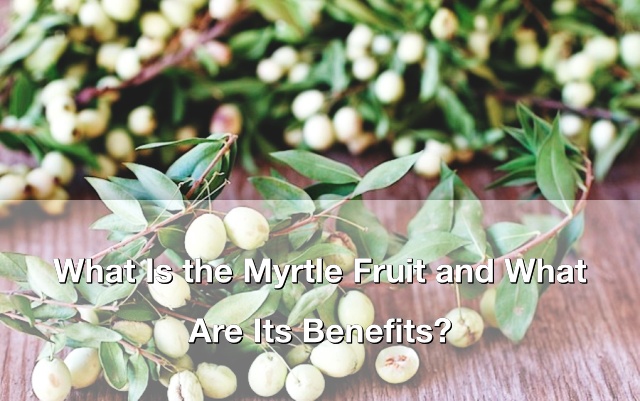
If you've ever wandered through a local market in the Mediterranean region, you've likely come across a small, colorful fruit known as myrtle. This underrated Mediterranean superfruit, often overlooked in discussions of exotic fruits, grows on small shrubs and bushes in areas with a Mediterranean climate. Known for its antioxidant properties and high vitamin content, myrtle fruit comes in yellow, white, red, or black varieties and resembles a chickpea in size. While its vibrant appearance draws attention, unripe myrtle can leave a tangy, slightly sour taste in the mouth.
Table of Contents
WARNING: This content is for informational purposes only and is not intended to provide medical advice. {alertError}
However, as it ripens, the fruit becomes sweeter and more aromatic, quickly becoming a go-to healthy snack and a natural immune booster in many local diets. Let’s explore what makes this underrated Mediterranean superfruit so special.
SEE ALSO: The Health Benefits and Risks of Mushrooms: How to Tell If Mushrooms Are Bad
What Is Myrtle?

Myrtle is a drought-resistant plant with dense, green foliage. Its leaves are tough and sticky, while its small white flowers emit a pleasant fragrance. This plant is commonly found along roadsides and mountainous areas throughout the Mediterranean region. It requires little water and can grow naturally without much care. Some myrtle shrubs can grow over five meters tall, making them both resilient and striking in appearance.
SEE ALSO: The Benefits and Side Effects of Cauliflower: A Complete Guide
Although similar in size to a chickpea, the inside of the myrtle fruit is filled with tiny seeds that resemble the grainy texture of a fig. As it ripens and its color deepens, the flavor becomes more intense and enjoyable. But taste is only part of the story—myrtle fruit also offers a variety of health benefits.
SEE ALSO: Discovering the Health Benefits of Goji Berries
What Are the Benefits of Myrtle?
Those familiar with its taste often consider myrtle a hidden gem. It can be eaten fresh, dried, or brewed into a tea. Here are some of the key benefits of this remarkable fruit and its leaves:
- Natural Antiseptic Power: Myrtle helps prevent the formation of bacteria and kills existing microbes.
- Supports Clearer Skin: It can be helpful against acne and other skin issues.
- Fights Colds Naturally: Tea made from its leaves may help protect against colds and the flu.
- Clears Chest Congestion: Boiling the leaves and drinking the infusion may ease phlegm and congestion.
- Strengthens Your Body’s Natural Defenses: It provides a protective shield against metabolic disorders and enhances the immune system.
- Relieves Digestive Discomfort Naturally: It can help soothe nausea and vomiting.
- Boosts Appetite the Natural Way: For those struggling with low appetite, myrtle may help increase it.
- Flushes Toxins from the Body: It supports urinary tract health and may help with infections when consumed as a tea.
- Heals Inside and Out: It may help in treating eczema, sore throat, and even lung infections—especially when the leaves are used.
- Balances Blood Sugar Levels: Its slightly bitter taste may be beneficial for individuals with diabetes.
- Protects Your Heart: Myrtle contributes to cardiovascular health and helps balance cholesterol levels.
- Improves Gut Health: It can eliminate harmful bacteria in the intestines and support digestion.
- Promotes Hair Color and Prevents Hair Loss – A Traditional Remedy: The fruit has been traditionally used to add color to hair and reduce hair loss.
Despite its many benefits, myrtle should be consumed in moderation—especially by individuals with chronic conditions. Like anything in nature, overconsumption may have side effects, so always consult your doctor if unsure.
SEE ALSO: Zinc Deficiency: Symptoms, Causes, and How to Fix It Fast
Final Thoughts
Myrtle fruit may be small in size, but it's packed with impressive health benefits. As one of the lesser-known Mediterranean superfoods, this antioxidant-rich fruit supports everything from skincare to immune defense and even natural hair care. It's a true hidden gem among healing plants and traditional herbal remedies.